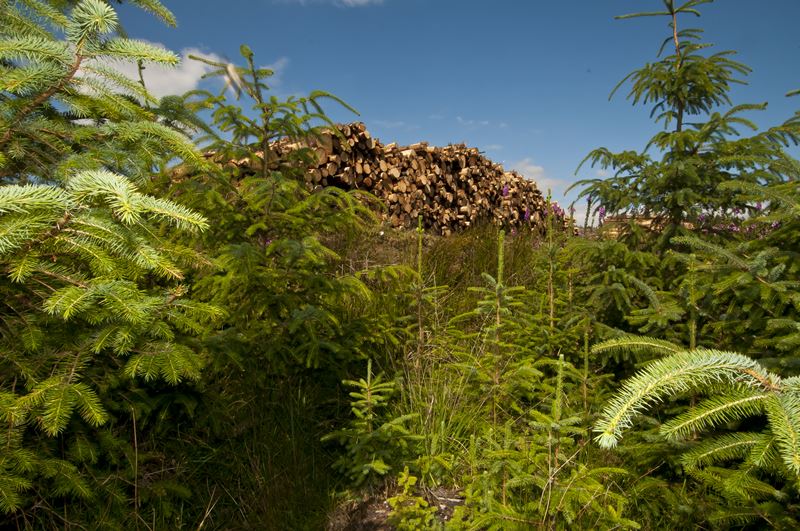- Date:Fri, Aug 12, 2016
UK FORESTRY SUCCESS STORY JEOPARDISED BY LOSS OF TREE COVERFor immediate use, Friday August 12 th 2016
A NEW report has heightened concerns that Great Britain is losing its productive forest resource - because trees that are harvested are not being replaced.
Estimates of Change in Canopy Cover in British Woodlands , published today by The Forestry Commission, shows that for every 100 hectares of coniferous woodland harvested in 2006, only just over half has been restocked with productive conifer species. (see Table 22 on Page 60 of the report )
Forestry sector bodies Confor, UK Forest Products Association (UKFPA) and Wood Panel Industries Federation welcomed the report, but warned the failure to restock, combined with a historically low level of new planting, threatens the longer term future of the forestry and timber sector, which supports more than 40,000 jobs and contributes £1.7 billion annually to the UK economy.
“A reduction in area is to be expected as 20 th century plantations are replaced by more diverse, modern, multi-purpose forests, but the scale of these losses presents a serious risk to the future of one of the UK’s few sustainable and low-carbon industries,” said Andrew Heald, Technical Director of trade body Confor: promoting forestry and wood.
The report shows some of the harvested forest is being replanted with broadleaf species, but large areas are being left unplanted as open ground or left fallow for long periods, reducing the timber available to make the everyday products that society needs, from wood for building homes to fencing, decking, furniture and packaging for food. [This relationship between forests and everyday products is highlighted in Confor's short film, Animating Forestry ]
The failure to restock areas that have been forested has long-term implications. The UK is the world’s third largest net importer of timber and wood products, and at the beginning of the 20 th Century had only 5 per cent forest cover. Forest cover has expanded to 13 per cent (against a European average of 36 per cent) and the UK has developed a world-class forestry sector.
“Failing to replant our woodlands with productive crops after harvesting is simply unsustainable,” said David Sulman, Executive Director of the UKFPA. “We have made very good progress in the long-term sustainable management of our forests and woodlands, which is essential for both domestic economic development, improved biodiversity and to minimise the UK’s global environmental footprint. The reduction in productive planted area is a very serious issue for the industry.”
The private forestry sector has raised concerns about both the quantity and quality of restocking in the UK’s productive softwood forests for many years. Global trade in timber is dominated by softwood and about 90 per cent of all wood products used in the UK are from softwood forests.
Alastair Kerr, Director General of the Wood Panel Industries Federation (WPIF) said: “The emergence of a major UK forestry and wood processing sector, which is internationally competitive, has been a considerable success story, playing a key role in meeting carbon reduction targets and enabling the UK panel industry to supply up to two-thirds of the domestic demand for its product types. It is vital to the long-term investment and growth of processing industries that that the decline in domestic commercial softwood planting is addressed as a matter of priority.”
Earlier this week, conservation charity WWF issued a warning that UK businesses face a timber supply crunch as leading countries that supply wood products to the UK, face running out of timber in the next few years.
The supply crisis has been exacerbated by the failure of the UK and devolved governments to meet planting targets. In 2015, only 122 hectares of new woodland (all broadleaves) were planted in Wales compared to a target of 2,000 hectares, whilst in recent years the Assembly Government has converted nearly 20,000 hectares of productive conifer woodlands to either broadleaves or open ground.
In England, the latest official statistics show that only 546 hectares were planted between April 2015 and March 2016 - less than 30 per cent of the annual target needed to meet a manifesto commitment by the Conservative Party to plant 11 million trees by 2020.
Investment in sawmills and panel board manufacturing across the UK, including Norbord’s recently-announced £90 million investment at Inverness, demonstrates confidence in the UK sawmilling and wood processing sector. However, that confidence will only remain if future timber supplies can be guaranteed.
In Scotland, the Government has set ambitious woodland creation targets and Fergus Ewing, Cabinet Secretary for Rural Economy and Connectivity, has stressed his commitment to hit the targets and help secure the future of this vital rural industry.
Confor, UKFPA and WPIF, have united to call on the UK, Welsh and Northern Irish Governments to match this commitment form the Scottish Government and act urgently to ensure all harvested areas on both public and private lands are fully and appropriately restocked and that the UK’s valuable softwood resource is protected, as part of the future sustainable development of the UK.
In a joint statement, the organisations said: “Governments across the UK have strong international commitments to sustainable forest management. It is time that commitment is also focused on forest management a little closer to home – by increasing tree cover, ensuring adequate planting of productive timber crops and assuring the continued success of the forestry and forest products sector.”
The report can be accessed here
For more information, contact:
Andrew Heald 07771 844653 [email protected]
David Sulman 07771 705479 [email protected]
Alastair Kerr 07764273306 [email protected]


